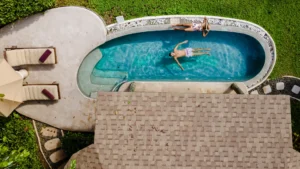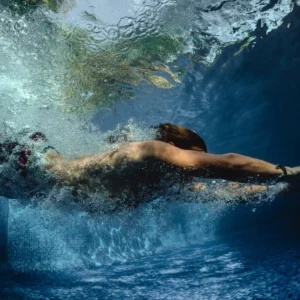
Have you ever experienced a feeling of nausea after swimming? Have you ever thought that perhaps it was more than just having some water trapped in your ears? If you find yourself in discomfort, feeling unwell, or in pain after spending time in the pool, you may be dealing with one of the common sick after swimming reasons beyond the usual tiredness that often comes after exercising.
Here are three possible reasons you may feeling sick after swimming.
1. Tummy and earaches

Earaches are one of the most common post-swimming complaints. Throbbing or sharp pain could be a sign of a recreational water illness. This could also apply if you were running to the bathroom the moment you got out of the water. Stomach cramps and earaches can be symptomatic of recreational water illnesses (RWIs). These symptoms stem from exposure to germs from contaminated water.
The U.S. Centers for Disease Control and Prevention urge disposal in understanding how water can be a very easy medium for germs to spread. RWI can compromise a person’s health after exposure to contaminated water.
Therefore, awareness of risks when it comes to swimming and other water activities is very important. Chlorine is famous for destroying many types of bacteria, but it does not kill all germs. For example, one parasite, Cryptosporidium-commonly termed “Crypto” -is far more resistant to the chemicals formulated for pool sanitation.
Furthermore, with every person who enters the pool, the body’s pH would thereby interfere with and change the concentration of chlorine in the water, which would, in turn, affect its potency. That’s why we recommend you keep checking even weekly these chlorine levels to avoid any future disease.
2. Muscle cramps and pains

Another type of soreness that has nothing to do with chlorine is muscle cramps and pains. These are quite common, as USA Swimming reported that around 95 percent of the general population cramps up after a workout.
If you typically get cramps after a swim, it could be that you’re not stretching properly. Be sure to dedicate a few minutes to flex and contract your legs, arms, neck, back and abdominal muscles before and after every swim.
Muscle cramps and pains could also be a sign that you’re dehydrated. Drink plenty of fluids while you’re out in the sun and especially when you’re exercising. Swimming USA indicated that foods rich in potassium can reduce the risk of cramps.
Every Day Health pointed out that a potassium deficiency can cause your muscles to weaken. If you are looking to increase your potassium intake while enjoying a relaxing day by the pool, consider snacking on some delicious apricots or juicy peaches.
Also, remember to bring along your water bottle to stay hydrated throughout your time in the sun. Staying hydrated is important, especially when you spend time outdoors. Enjoy your snacks and refreshments!
3. Dizziness and lack of coordination

According to the U.S. National Library of Medicine, dehydration occurs when you lose a lot of body fluid. Hence, swimming in the pool makes it a bit tricky to know how much you sweat, so you need to take special precautions.
The signs that can show your body might be needing water as you come out of the swimming pool includes:
- Thirst
- Dryness of mouth
- And sometimes you might feel a bit lightheaded.
If you’ve been swimming, and believe you are dehydrated, you should drink water or an electrolyte beverage as soon as possible or simply try sucking on an ice cube, suggested the source.
If untreated, dehydration can cause serious medical problems in the future. Don’t let it be too late; drink lots of water and take brief breaks from swimming when you feel tired.
Understanding your body’s messages is a great way to enjoy swimming in safety and health.
Why do I feel weird after swimming?
Are you not feeling well? Get the necessary medical attention first before going back to the pool. You can lessen the chances of falling ill by hiring pool services like Fort Worth, Phoenix or Miami pool service experts. A sanitized swimming pool means a healthier you.
FAQs: Feeling Sick After Swimming
1. Why do I feel sick after swimming?
Stomach and earaches after swimming are common symptoms of Recreational Water Illnesses (RWI), which are caused by germs found in contaminated water. Even chlorinated pools can host chlorine-resistant microorganisms like Cryptosporidium.
If you experience pain, nausea, or digestive upset after swimming, it could be due to exposure to these pathogens.
2. Can pool water make you sick?
Yes. Water may look clear but still contains harmful germs. Chlorine doesn’t kill all bacteria instantly, and its effectiveness depends on proper chemical balance.
If chlorine levels are too high or too low, pathogens can thrive, increasing your risk of getting sick after a swim, so be sure to hire a professional for this kind of job.
3. What causes muscle cramps while swimming?
Muscle cramps are often caused by dehydration, lack of stretching, or potassium deficiency. Even though you’re in water, your body still loses fluids through sweat.
Not drinking enough water or neglecting pre- and post-swim stretches can increase the likelihood of cramps.
4. Does chlorine make you tired?
Signs of dehydration include dry mouth, thirst, lightheadedness, and fatigue. Swimming can mask sweat loss, making it easy to become dehydrated without realizing it.
Drink water before, during, and after swimming to prevent dizziness and problems with balance.
5. Why do I feel like vomiting after swimming?
Germs like Giardia and Crypto can survive in poorly chlorinated water. Always ensure your pool is regularly tested and treated by professionals to reduce your risk of infection.
6. How to stop feeling sick after swimming?
To prevent post-swim sickness:
- Shower before and after swimming.
- Avoid swallowing pool water.
- Stay hydrated with water or electrolyte drinks.
- Stretch properly to avoid cramps.
- Eat potassium-rich snacks like peaches or apricots.
- Hire a pool service to maintain optimal water quality.







